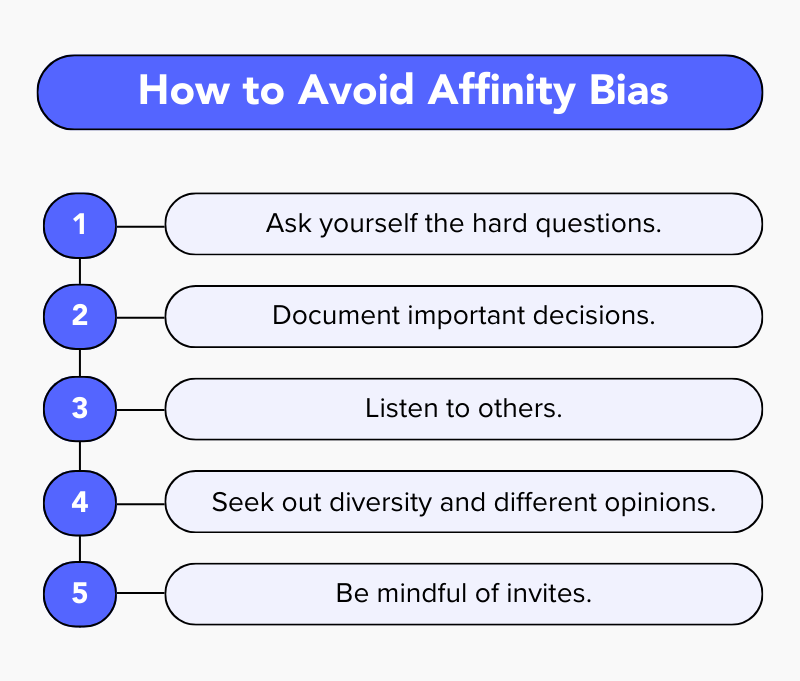Have you ever been in a room full of strangers and immediately gravitated to the person who looked like they have the most in common with you? You probably didn’t realize it, but in that moment, you likely acted on what is known as affinity bias.
Affinity bias is the tendency to favor someone because they’re similar to us. It’s a type of cognitive bias that can lead us to make all sorts of judgments and decisions that aren’t necessarily rational. We’re all susceptible to this bias, whether we realize it or not.
Affinity bias can be helpful in some situations. But it can also lead us astray— especially in the workplace.
Affinity bias definition
Affinity bias is the tendency to prefer people who are similar to us. Under the influence of affinity bias, we are more likely to trust and cooperate with people who share our values, beliefs, and background. This bias can lead us to surround ourselves only with people who think like us, which can limit our ability to see other points of view.
Affinity bias definition: Affinity bias is a type of unconscious bias that leads people to seek out or gravitate to others who are like them.
Early on in human history, this natural inclination was evolutionarily advantageous. According to researcher Jeffrey Davis, affinity bias, at one time, allowed us to “disperse, fragment, and form complex social networks and diverse cultural belief systems.”
Today, however, unconscious biases can negatively impact our behavior. Among other reasons, falling into the trap of affinity bias can lead to bad decisions, cause us to miss out on new experiences, curb creativity, and limit our ability to empathize with others.
Affinity bias examples
While affinity bias can occur in any situation, it is especially common in the workplace.
“Affinity bias is prevalent in many workplaces and is a large driver of unequal outcomes in hiring, developing, and promoting diverse employees,” says HR expert and JobSage advisor Kelli Mason.
To better understand what affinity bias can look like, here are two scenarios that illustrate this unconscious bias at work.
Example 1
Sarah, a project manager at a marketing firm, is assembling a team for an upcoming client campaign.
Despite receiving applications from a diverse pool of candidates with varying backgrounds and skillsets, Sarah finds herself gravitating towards individuals who share her alma mater and interests outside of work. Unconsciously, she feels a sense of camaraderie and connection with these candidates. She believes they will mesh well together and understand each other’s perspectives easily.
As a result, Sarah ends up selecting a team composed mostly of individuals who resemble her in terms of background, hobbies, and experiences. In doing so, she inadvertently excludes qualified candidates who could bring unique insights and expertise to the project.
Example 2
At a technology company, two employees, Michael and Maria, are up for promotion to a managerial role.
Michael has a similar background and communication style as the senior leadership team. He is well-liked and often socializes with the executives during company events. Maria, on the other hand, comes from a different cultural background and tends to keep a lower profile. She tends to focus on her work rather than networking.
Despite both employees demonstrating exceptional performance and leadership potential, the senior leadership team unconsciously favors Michael due to their shared interests and rapport. As a result, Michael is promoted to the managerial role. Maria is overlooked, despite her qualifications and contributions to the company.

How to avoid affinity bias at work
Affinity bias is often discussed in hiring, but it can happen at any level of an organization at any time.
It happens to everyone, and it doesn’t mean you’re a bad person. The fact that you’re seeking out information on how to address it shows that you’re headed in the right direction!
1. Ask yourself the hard questions.
When you find yourself gravitating towards someone at work, stop and ask yourself why. Is it because they share your interests or characteristics? And it’s not just about who you hang out with— it can also affect the decisions you make at work. Are you only considering the ideas of those who already think like you? If you’re getting input from colleagues, ask yourself whose opinions you are placing more value on and why.
A good time to do this is before giving out reviews.
“Leaders can steer clear of affinity bias in performance reviews by reflecting on their potential biases before conducting the review process,” Mason says. “This ensures that you don’t evaluate direct reports who are similar to you less harshly than reports who are less similar.”
2. Document important decisions.
The best way to discover trends is to collect data. This means documenting important decisions like promotions and project opportunities so you can look back on your record.
“One way to avoid affinity bias creeping into professional development opportunities is for people managers to record opportunities they give to their team members,” Mason suggests. “Review the record periodically to ensure that everyone receives similar opportunities, regardless of their affinity.”
3. Listen to others.
Really listen to what other people are saying, even if you disagree with them. Not only will this help you to understand their point of view, but it will also show them that you respect them as an individual. Don’t automatically dismiss what they have to say because you perceive them as different.
4. Seek out diversity and different opinions.
Make a conscious effort to seek out people who have different opinions to you. This will help you to broaden your own perspective and avoid falling into the trap of only ever agreeing with people who think like you do.
Numerous studies support the importance of diversity. According to a McKinsey & Company study, businesses in the top quartile for gender diversity are 25% more likely to outperform their peers. Furthermore, businesses in the top quartile for ethnic diversity are 36% more likely to outperform peers.
5. Be mindful of invites.
If you find yourself gravitating towards certain people, help yourself level the playing field by getting to know others. Building relationships with new people can help you find common ground and understand the value that others bring to the table.
Mason notes that an easy way to do this is to be mindful of social event invites.
“Another way to avoid affinity bias in internal relationship building is to ensure department leaders invite everyone to social events,” Mason notes. “More importantly, be mindful that opportunities to socialize outside of the workplace are inclusive in terms of activity and timing.”
6. Encourage feedback.
Feedback can be a great way to get insights on blind spots you may have. Whether you’re seeking feedback from your managers, colleagues, or those you manage, peer reviews can be a helpful tool to learn how your actions and decisions may be impacting others. It’s also a good time to give others feedback on how their unconscious biases may be affecting you.
The bottom line
Affinity bias may be holding you back from creativity, new experiences, and better decisions. The next time you’re making a decision, ask yourself if you’re considering all the relevant information, or if you’re just going with your gut because the person reminds you of yourself.
You might be surprised what you gain from seeking out the company and opinions of others!
